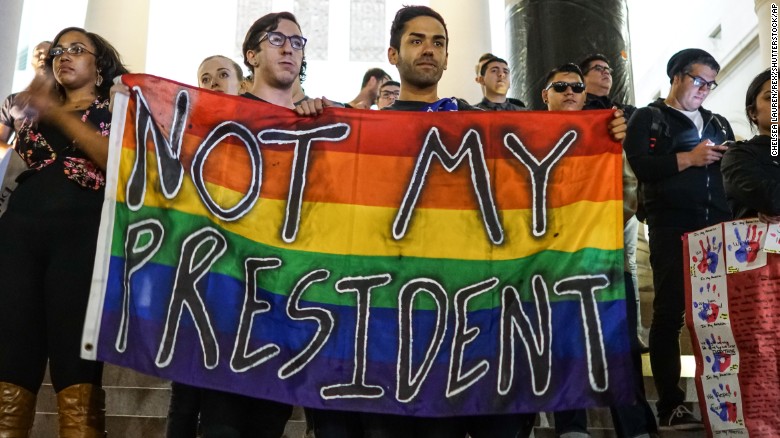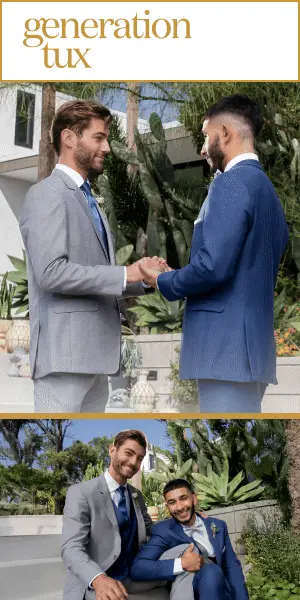We’ve all heard the social rule that we should avoid talking about religion and politics if we want to keep the peace, and I sometimes feel that way when I’m around the Trump supporters in my family. I’d like to take the easy route and just tune them out, say that we should all stick to lighter topics like how my wedding planning is going or what my cousin is studying in college.
But the personal is political, and that’s even truer for me under the Trump administration. I’m queer, disabled and nonbinary, and this government has proven that it doesn’t want people like me to exist or succeed.
As much as it hurts to say this, I don’t want the Trump supporters in my family to come to my wedding.
When I proposed to my girlfriend, I wasn’t thinking about our wedding. I was only thinking about how much I love her and that I want to spend the rest of my life with her. I wasn’t considering that we both have Trump supporters and Kavanaugh apologists in our families, and how much it would hurt to listen to grown men debate at dinner about whether Kavanaugh is guilty considering I’m a rape and sexual assault survivor.
In many respects, I’m incredibly lucky. Most of my family is liberal and my dad, who I’m closest to, has always supported my queer identity and my relationship. He didn’t vote for Trump and openly fact checks other people in our family when he knows they don’t have the details right. He listens and is willing to learn. We’ve talked at length about abortion rights, the Black Lives Matter movement and how to use the correct names and pronouns for trans and nonbinary people. But there are people in my family and my partner’s family who voted for Trump and are proud of it, who believe that we should be voting no on Question 3 in Massachusetts and rolling back trans rights.
I’ve been faced with this question many times in my life: Can I love someone even if I disagree with them?
What if the topic we disagree about isn’t simple, like whether candy corn is a tasty Halloween treat or a terrible excuse for candy? What if what they disagree about impacts my rights as a person or the rights of other people I love?
When I first came out as queer as a teenager, I felt strongly that everyone should know and there wasn’t a place in my life for anyone who couldn’t accept me. I have always been strongly grounded in my morals, especially when it comes to human rights.
The reality is murkier, though. There are many times that I’ve had to let go of my friends’ and family members’ views if I wanted to keep them in my life. There are people who care about me who don’t believe that we should have universal health care. It’s emotionally exhausting to reconcile because I need access to health care, and under the current system, there have been months where I’ve gone without seeing a doctor or getting any treatment for my disabilities because I didn’t have insurance. When the personal is political, how can I choose to keep someone in my life if their beliefs negatively impact my ability to live?
I don’t want to have to select who is invited to my wedding based on their political views or how they vote. What I will ask is that everyone who cares about me takes a step back to think about how their decisions affect other people.
You may have a job that comes with health insurance, but what about freelancers and the many underemployed Millennials whose jobs don’t offer it? What about people with disabilities or trans and nonbinary people whose employer-sponsored health insurance doesn’t cover their needs? You may believe that Kavanaugh is innocent, but are you thinking about who in the room might be a rape survivor when you talk about it? You might not be worried about police violence ending your life, but what about the millions of Americans for whom this is a daily reality? You might not be worried about anyone in your family losing their rights because they’re undocumented, but what about the people who are terrified it will?
While I don’t want politics to be a conversation topic at my wedding, it will be something I talk about every day until and after that day. It’s something I need to talk about if I want anything to change. We all do.
Fin Leary
MOST VIEWED STORIES
- The Rise of Weddings With Long-Lasting Investments: Benefits Beyond The Big Day
- How to have a green wedding that Mother Earth would attend
- Simplify wedding communication with digital engagement announcements and thank you cards
- A Spiritual and Earthy Elopement at Lassen Volcanic National Park
- Food Trucks, Craft Booze and Cultural Fusions: How New England Weddings Are Changing the Game



























